In the United States, more than 6000 women reach menopause every day. And, for most of these women, menopause brings with it some very discomforting symptoms. Fortunately, there are quite a few menopause symptom management options that can ease the transition into menopause and improve the quality of life afterward. We examine them in full detail below.
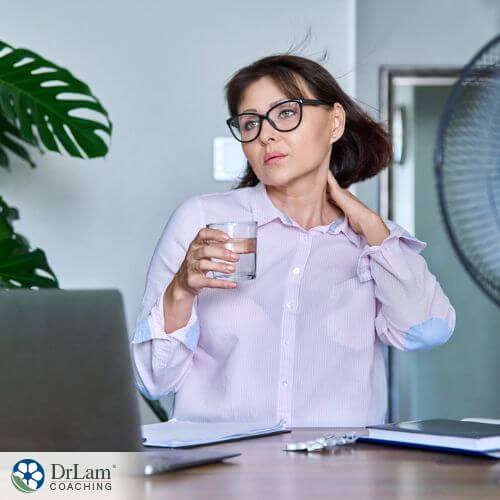 Menopause officially begins when a woman has not had a period for 12 consecutive months. The time before menopause can last 10 or more years and is technically known as "premenopause," but this time of hormonal transition is often colloquially referred to as "menopause," and will also be included in the term "menopause" for this article.
Menopause officially begins when a woman has not had a period for 12 consecutive months. The time before menopause can last 10 or more years and is technically known as "premenopause," but this time of hormonal transition is often colloquially referred to as "menopause," and will also be included in the term "menopause" for this article.
Around menopause, women begin to experience various symptoms, with some of these symptoms lasting long beyond menopause. While women experience menopause symptoms differently, below are the most common symptoms associated with menopause.
A hot flash is a sudden sensation of warmness, most intense in the upper body, especially the face, neck, and chest. The feeling of warmth may progress upward or downward and usually causes profuse sweating and face reddening. Hot flashes generally appear in the first year of menopause and can remain for more than ten years. While most women have hot flashes, some may experience cold flashes instead, which involve sudden feelings of cold.
Also known as vaginal atrophy, this condition occurs when there is thinning, drying, and inflammation of the vaginal walls. Often, people with this condition experience painful sexual intercourse. The vaginal skin may sometimes break during sex, exposing the woman to infections. Vaginal atrophy is due to a significant reduction in the hormone estrogen, which is crucial for vaginal lubrication and elasticity.
Women experiencing menopause may find it difficult to fall asleep. This may be due to night sweats, an increase in the urge to urinate, and mental changes. The lack of sleep at night may lead to tiredness and irritability during the day, which can interfere with the normal activities of the day.
During menopause, certain physical changes may arise, and these changes may persist for years after the start of menopause. They include:
Aside from the physical changes women in menopause may experience, certain mental health symptoms may accompany menopause. There typically involve low mood, depression, anxiety, mood swings, low self-esteem, and concentration difficulties. Considering these mental health symptoms, it is unsurprising that studies link menopause to suicide.1
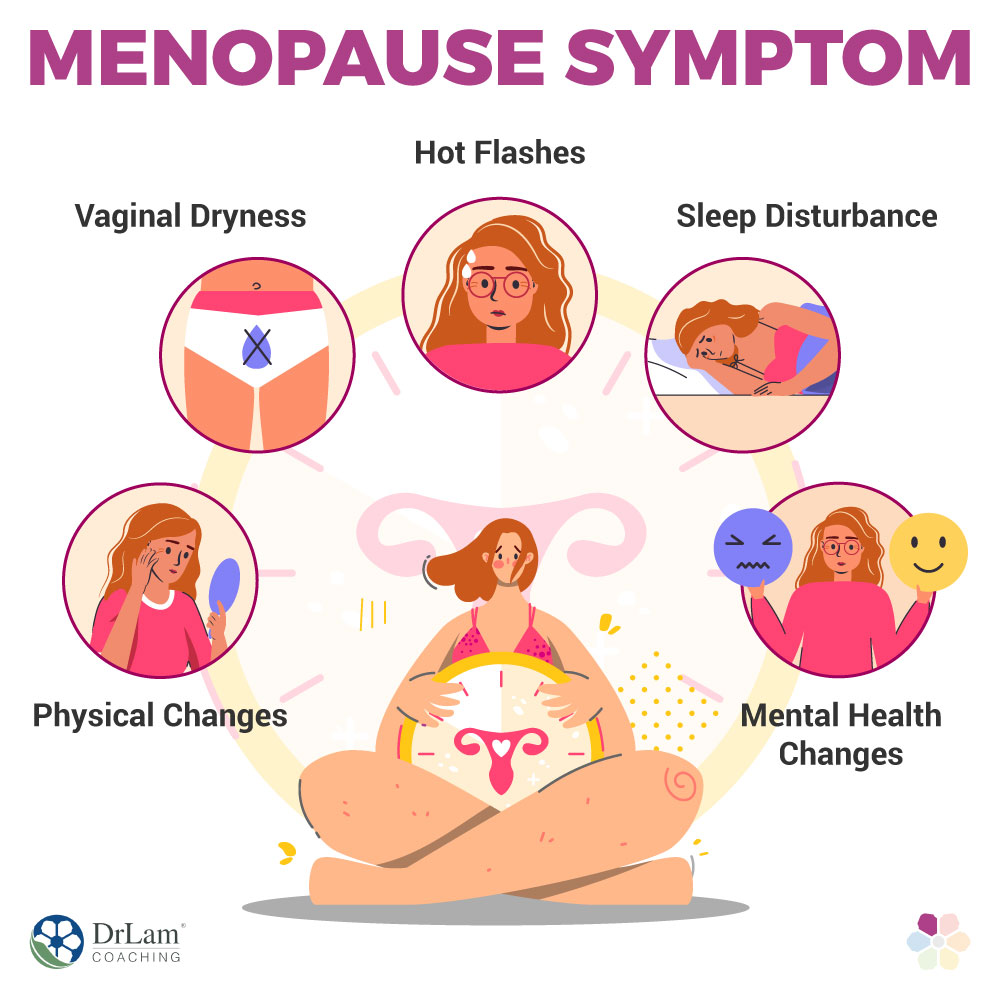
All of the symptoms of menopause can have a significant effect on quality of life. However, there are different menopause symptom management options available to mitigate the adverse effects of these symptoms. They are as follows:
During menstruation, the body undergoes different hormonal changes. The production of estrogen and progesterone by the ovaries decreases, which is responsible for most of the menopause symptoms women experience. Therefore, one of the commonest menopause symptom management options is hormone replacement therapy (HRT).
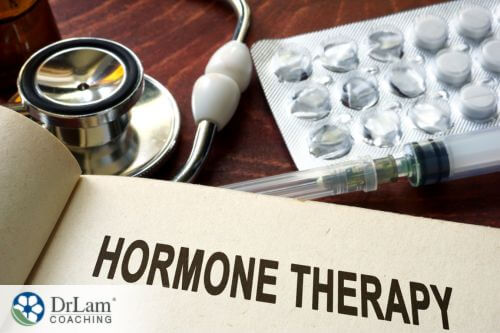 Also known simply as hormone therapy, HRT is the most effective management option for hot flashes. Aside from hot flashes, hormone therapy also helps manage the following symptoms: brain fog, muscle ache and joint pain, vaginal dryness, night sweats, and skin dryness. Studies also suggest that HRT effectively reduces depressed mood in menopausal women.2 Women with decreased libido because of menopause may be recommended testosterone if hormone replacement therapy doesn’t increase their sex drive.
Also known simply as hormone therapy, HRT is the most effective management option for hot flashes. Aside from hot flashes, hormone therapy also helps manage the following symptoms: brain fog, muscle ache and joint pain, vaginal dryness, night sweats, and skin dryness. Studies also suggest that HRT effectively reduces depressed mood in menopausal women.2 Women with decreased libido because of menopause may be recommended testosterone if hormone replacement therapy doesn’t increase their sex drive.
This therapy involves the use of medication that contains hormones that the body stops making during menopause. There are two primary types of hormone therapy: estrogen therapy and estrogen-progesterone/progestin therapy (EPT).
In estrogen therapy, medical practitioners prescribe low-dose estrogen for daily use. The application of estrogen is usually through pills, implants, patches, creams, vaginal rings, gels, or sprays. Estrogen also helps in preventing osteoporosis.3 The other type of hormone therapy involves a combination of estrogen and progesterone (or its synthetic form – progestin).
For the management of vaginal atrophy, healthcare providers may recommend vaginal estrogen. This therapy option is typically administered directly to the vagina through estrogen creams, tablets, or gel. There is a steady release of estrogen from the medication into the vaginal tissues, which can help alleviate vaginal dryness. This may significantly reduce pain during sex.
Vaginal estrogen therapy is also a useful menopause symptom management option for urinary conditions associated with menopause.4
Note that since the estrogen released from vaginal estrogen medications and creams does not enter the bloodstream, this therapy can be used for long periods without the health risks HRT poses. However, for the same reason, because estrogen does not enter the bloodstream, symptoms often return after the therapy stops.
Bioidentical hormones are hormones that are specially designed to mimic those produced by the body. While the FDA has approved some bioidentical hormones, many of them are custom-made by licensed pharmacists and referred to as compounded bioidentical hormones. A 2015 study showed that as many as 2.5 million women in the United States use compounded bioidentical hormones.5 Research suggests that bioidentical replacement hormone therapy (BHRT) can be particularly effective for improving mood in menopause symptom management.6
While the FDA states that compounding is legal and ethical as long as a licensed pharmacist does it, the efficacy and safety of this type of bioidentical hormones is unknown. Therefore, the use of compounded bioidentical hormones is generally limited to when FDA-approved hormone therapy formulations are unavailable.
This menopause symptom management option does not involve using estrogens and other hormones. Non-hormonal medication therapy is common among women who cannot or decide not to have HRT. However, do be aware that many of these medications have significant side effects and are often not recommended because of them.
Low doses of SSRIs (selective serotonin reuptake inhibitors) and SNRIs (serotonin and norepinephrine reuptake inhibitors) can reduce the frequency and severity of menopausal vasomotor symptoms by up to 64%.7 These antidepressants were particularly useful in the management of hot flashes, as well as among women who have mood disorders. Examples of medications for this menopause symptom management option are venlafaxine, paroxetine, and citalopram.
In randomized controlled trials, gabapentin (an anticonvulsant) has shown encouraging results in managing nighttime hot flashes. Another anticonvulsant, pregabalin, can also be used for the same purpose.8
This centrally-acting antihypertensive medication has also shown positive results in menopause symptom management. Clonidine comes in pills and patches and is a promising management option for hot flashes.9
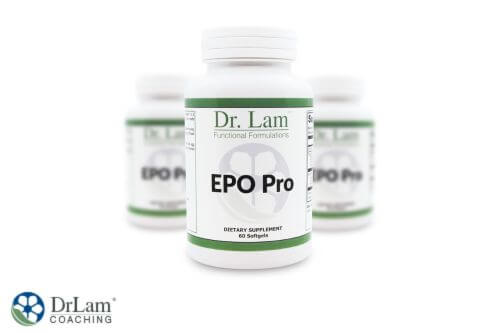 The use of supplements and herbs to manage different health conditions is not a new concept. Recently, their use has seen a drastic rise, possibly due to people exploring more natural ways to manage their conditions. For menopause symptom management, certain supplements and herbs have been identified as particularly useful.
The use of supplements and herbs to manage different health conditions is not a new concept. Recently, their use has seen a drastic rise, possibly due to people exploring more natural ways to manage their conditions. For menopause symptom management, certain supplements and herbs have been identified as particularly useful.
Evening primrose is a wildflower that grows across the United States. The use of this flower in a medical sense dates back to Native Americans using it for the management of bruises and some minor skin conditions. Evening primrose oil has been suggested as suitable for the management of hot flashes from menopause.
However, studies show that the oil does not significantly decrease the frequency and duration of hot flashes. Instead, evening primrose oil effectively reduced the frequency and severity of night sweats. This implies that the medication is still a promising management option for menopausal symptoms, and more research is needed to understand its effects.10
This is a flowering plant that has also been used for centuries by Native Americans in the management of different health conditions. Nowadays, black cohosh is commonly used for relief from menopausal symptoms, particularly hot flashes, vaginal atrophy, and night sweat. Studies to validate the use of the plant for menopause symptom management have so far been inconclusive.
One study suggested that black cohosh can modestly reduce the frequency of vaginal dryness and hot flashes but was not effective in managing night sweats.11 Another study found no significant statistical effectiveness in the use of black cohosh for these symptoms.12
However, both studies agree that there is adequate justification for further rigorous studies about black cohosh and menopause symptom management. This essentially means the plant could be a helpful herbal supplement for managing menopausal symptoms.
Research suggests that ginseng may increase libido, improve mood, improve sleep, and promote a general sense of well-being in menopausal women.13 However, there has been little clinical research on ginseng in the management of hot flashes. As with many other supplements used for managing menopausal symptoms, more evidence is needed to make definitive statements about ginseng’s effectiveness for menopause symptom management.
Soybeans and other soy-containing foods are rich in isoflavones, which, like human estrogen, can bind to estrogenic receptors in the body. Soy has weaker estrogenic or anti-estrogenic effects when it binds. However, since many menopausal symptoms are due to an estrogen deficiency, soy should theoretically have some positive effects on menopause symptom management.
Research on soy’s effects in managing menopausal symptoms has been mixed. While some researchers note that soy can reduce the frequency and duration of hot flashes,14 other findings suggest that any improvements soy made were not clinically significant.15
More research is required to confirm any role soy may play in the management of menopausal symptoms. Since soy still has some estrogen-like effects, ensure you talk to your doctor if you intend to include it in your long-term diet plan.
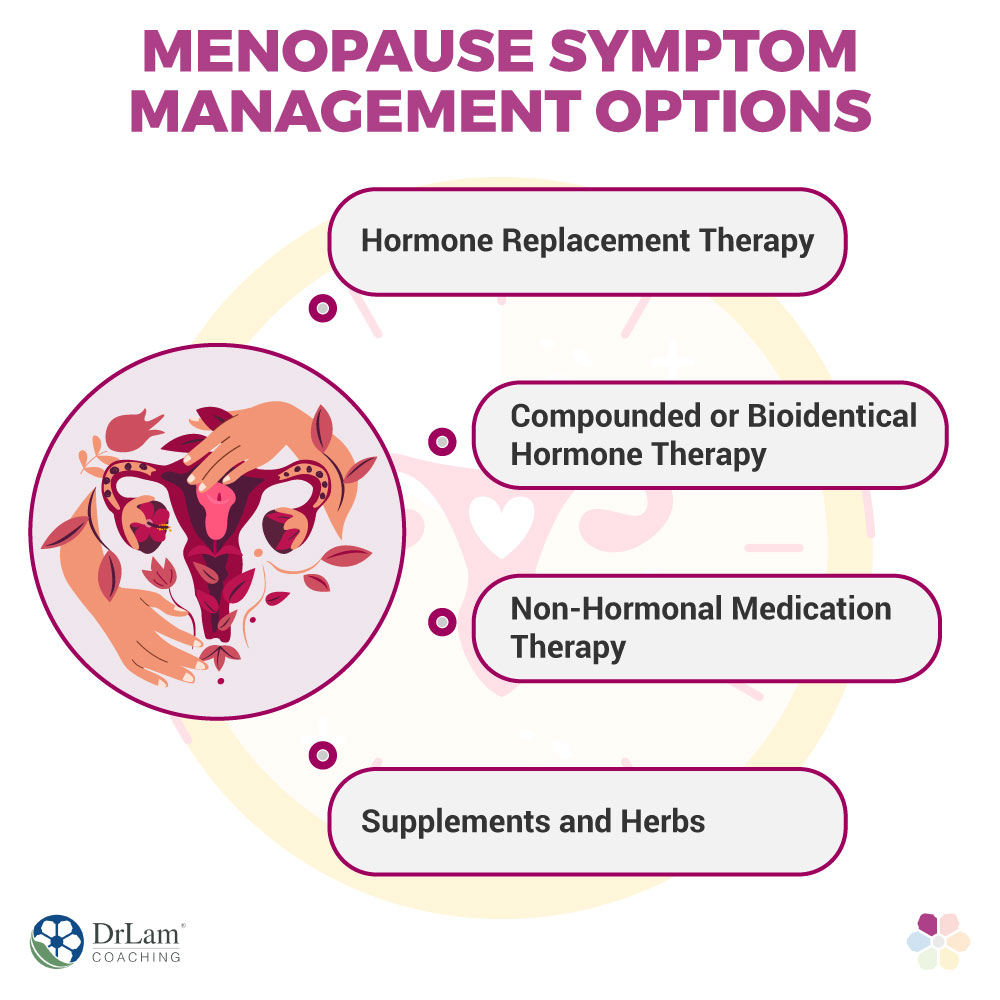
These methods do not involve the use of any medication for menopause symptom management. While these remedies may be insufficient as standalone management options for menopausal symptoms, they can help a lot with reducing the severity of many symptoms and improving the quality of life.
 One of the major causes of hormonal imbalances in the body is stress. The body has an in-built stress-coping system known as the NeuroEndoMetabolic (NEM) Stress Response. The NEM system consists of six circuits across several organs in the body. The hormone circuit is concerned with the production and regulation of different hormones in the body.
One of the major causes of hormonal imbalances in the body is stress. The body has an in-built stress-coping system known as the NeuroEndoMetabolic (NEM) Stress Response. The NEM system consists of six circuits across several organs in the body. The hormone circuit is concerned with the production and regulation of different hormones in the body.
Dysregulation of this circuit can impact hormone balance and lead to several physiological changes in the body, including those related to menopausal symptoms. If the dysregulation of the hormone circuit persists, Adrenal Fatigue Syndrome (AFS) may arise. Adrenal fatigue is a condition that occurs when the body cannot keep up with chronic stress and the body's demands for the stress hormone, cortisol.
To manage this condition and other menopausal symptoms, relaxation exercises can be useful. These exercises relax the body, which reduces stress, and hence keeps hormones functioning as they should. Examples of these relaxation practices are yoga, breathing exercises, and meditation.
Keep your environment cool, especially around nighttime. Also, ensure you wear loose clothing when going to bed. Consider sleeping in natural, temperature-regulating fabrics like linen, cotton, or merino wool. This can help you stay comfortable all through the night and reduce the chances of night sweats.
Physical activity has a lot of benefits for the body, and menopause symptom management is one of them. While exercise may not help prevent hot flashes, vaginal atrophy, or night sweats, which are some of the most typical menopausal symptoms, it can help improve the quality of life. Regular exercise can boost energy levels, lead to better sleep, raise mood, and improve your overall sense of well-being. All of these benefits can, in turn, benefit menopausal women.
Cognitive behavioral therapy (CBT) and counseling can help with the management of depressed mood, anxiety, and even physical symptoms, like joint pain and hot flashes common in menopause. While CBT is usually done with a professional, you can also notice improvements in mood and general sense of well-being if you talk with friends and relatives as well.
Drinking alcohol and smoking cigarettes can worsen menopausal symptoms and increase health risks. If you cannot completely cut out alcohol, ensure you significantly limit its intake to the barest minimum. Also, be mindful of secondhand smoke exposure.
Below are some of the risks associated with the different menopause symptom management options.
While HRT is a common menopause symptom management option, especially for hot flashes, health practitioners only recommend the lowest effective dose for the shortest time possible. This is because of the complications associated with HRT.
Although most healthy women can take HRT for around five years after menopause begins, further use can lead to different health risks. These include an increased risk of breast cancer, endometrial cancer, stroke, and dementia. One study found that risks associated with long-term use of HRT far outweighed the potential benefits of the therapy.16
In some cases where HRT is not applicable, healthcare providers may recommend BHRT. However, unlike HRT, the FDA does not conduct safety and efficacy testing for BHRT formulations. As such, much care is required when using this menopause symptom management option, ensuring only formulations from licensed pharmacists are considered.
The use of medications for menopause symptom management is not generally recommended by healthcare providers, except when other management options are poorly tolerated. This is because these medications also have significant side effects, which may even worsen other existing menopausal symptoms.
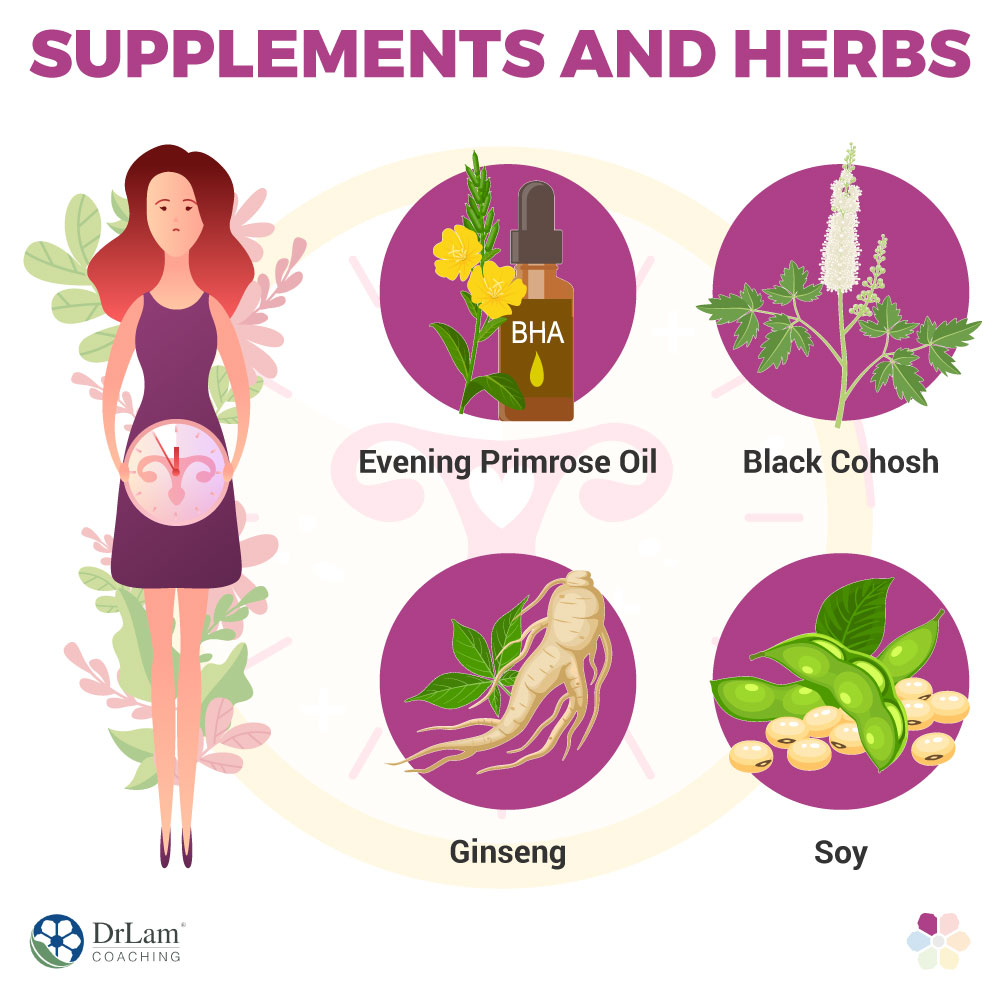
 The use of supplements and herbs in menopause symptom management has generated mixed reviews among researchers. While these supplements may not have many adverse effects on the body, their use for the management of menopausal symptoms is generally not as significant as many imagine. For instance, while producers claim soy, black cohosh, and red clover are effective in the management of hot flashes, medical literature does not back up these claims.
The use of supplements and herbs in menopause symptom management has generated mixed reviews among researchers. While these supplements may not have many adverse effects on the body, their use for the management of menopausal symptoms is generally not as significant as many imagine. For instance, while producers claim soy, black cohosh, and red clover are effective in the management of hot flashes, medical literature does not back up these claims.
Considering the inherent risk associated with supplement use, as they are not as closely regulated by the FDA as prescription drugs, it is essential to be careful with their use. Speak to your healthcare provider before using these supplements for menopause symptom management. Also, only purchase from reputable and trusted stores.
Menopause symptom management is critical, considering how much these symptoms can interfere with daily life. These different management options belong to two broad classes – those that use hormones and those that don’t.
Hormone replacement therapy, topical hormone therapy, and bioidentical hormone therapy employ hormones to manage menopausal symptoms. On the other hand, non-hormone medication therapy, supplements, and lifestyle-based management approaches do not use hormones for menopause symptom management.
While HRT is often the go-to therapy option, it poses multiple health risks when used for a long. This has led to a rise in the use of supplements like evening primrose oil and black cohosh. Ensure you get in touch with your healthcare provider before starting or stopping any of these menopause symptom management options.
For help choosing the best menopause symptom management options for your body individually, the team at Dr. Lam Coaching can help. We offer a free, no-obligation phone consultation at +1 (626) 571-1234 where we will privately discuss your symptoms and various options. You can also send us a question through our Ask The Doctor system by clicking here.
Kulkarni, J. “Perimenopausal Depression - An Under-Recognized Entity.” Aust Prescr, vol. 41, no. 6, 2018, pp. 183-185, https://www.ncbi.nlm.nih.gov/pmc/articles/PMC6299176/.
Zweifel, Julianne E., and William H. O’Brien. “A Meta-Analysis of the Effect of Hormone Replacement Therapy Upon Depressed Mood.” Psychoneuroendocrinology, vol. 22, no. 3, 1997, pp. 189-212, https://doi.org/10.1016/S0306-4530(96)00034-0.
Riggs, B. L. “The Mechanisms of Estrogen Regulation of Bone Resorption.” J. Clin. Investig., vol. 106, 2000, pp. 1203–1204, https://doi.org/10.1172/JCI11468.
Morsy, Samer Mahmoud, et al. “Does Local Vaginal Estrogen After Transvaginal Tension-Free Vaginal Tape-Obturator Reduce Overactive Bladder Symptoms in Postmenopausal Women? A Prospective Randomized, Controlled Study.” Asian Journal of Urology, 2022, https://doi.org/10.1016/j.ajur.2022.03.014.
Pinkerton, J. V., and N. Santoro. “Compounded Bioidentical Hormone Therapy: Identifying Use Trends and Knowledge Gaps Among US Women.” Menopause, vol. 22, no. 9, 2015, pp. 926-936, https://doi.org/10.1097/GME.0000000000000420.
Ruiz, A. D., et al. “Effectiveness of Compounded Bioidentical Hormone Replacement Therapy: An Observational Cohort Study.” BMC Womens Health, vol. 11, no. 27, 2011, https://doi.org/10.1186/1472-6874-11-27.
Stubbs, C., et al. “Do SSRIs and SNRIs Reduce the Frequency and/or Severity of Hot Flashes in Menopausal Women.” J Okla State Med Assoc., vol. 110, no. 5, 2017, pp. 272-274.
Kaunitz, A. M., and J. E. Manson. “Management of Menopausal Symptoms.” Obstet Gynecol, vol. 126, no. 4, 2015, pp. 859-876, https://doi.org/10.1097/AOG.0000000000001058.
Kazemi, F., et al. “The Effect of Evening Primrose Oil Capsule on Hot Flashes and Night Sweats in Postmenopausal Women: A Single-Blind Randomized Controlled Trial.” J Menopausal Med., vol. 27, no. 1, 2021, pp. 8-14, https://doi.org/10.6118/jmm.20033.
Franco, O. H., et al. “Use of Plant-Based Therapies and Menopausal Symptoms: A Systematic Review and Meta-Analysis.” JAMA, vol. 315, no. 23, 2016, pp. 2554-2563, https://doi.org/10.1001/jama.2016.8012.
Leach, M. J., and V. Moore. “Black Cohosh (Cimicifuga spp.) for Menopausal Symptoms.” Cochrane Database Syst Rev., 2012, no. 9, CD007244, https://doi.org/10.1002/14651858.CD007244.pub2.
Lee, H. W., et al. “Ginseng for Managing Menopausal Woman’s Health: A Systematic Review of Double-Blind, Randomized, Placebo-Controlled Trials.” Medicine (Baltimore), vol. 95, no. 38, 2016, e4914, https://doi.org/10.1097/MD.0000000000004914.
Chen, L. R., et al. “Isoflavone Supplements for Menopausal Women: A Systematic Review.” Nutrients, vol. 11, no. 11, 2019, 2649, https://doi.org/10.3390/nu11112649.
Levis, S., and M. L. Griebeler. “The Role of Soy Foods in the Treatment of Menopausal Symptoms.” J Nutr., vol. 140, no. 12, 2010, pp. 2318S-2321S, https://doi.org/10.3945/jn.110.124388.
Mayor, S. “Review Warns that Risks of Long Term HRT Outweigh Benefits.” BMJ, vol. 325, no. 7366, 2002, https://www.ncbi.nlm.nih.gov/pmc/articles/PMC1124208/.
Herbal supplements have proven to be useful in the management of a lot of conditions, but while research shows evening primrose oil can help with night sweats, they may not be as helpful for menopause symptom management as commonly marketed supplements are claimed to be. However, herbs do generally have fewer side effects than medications and may be safer to try.
